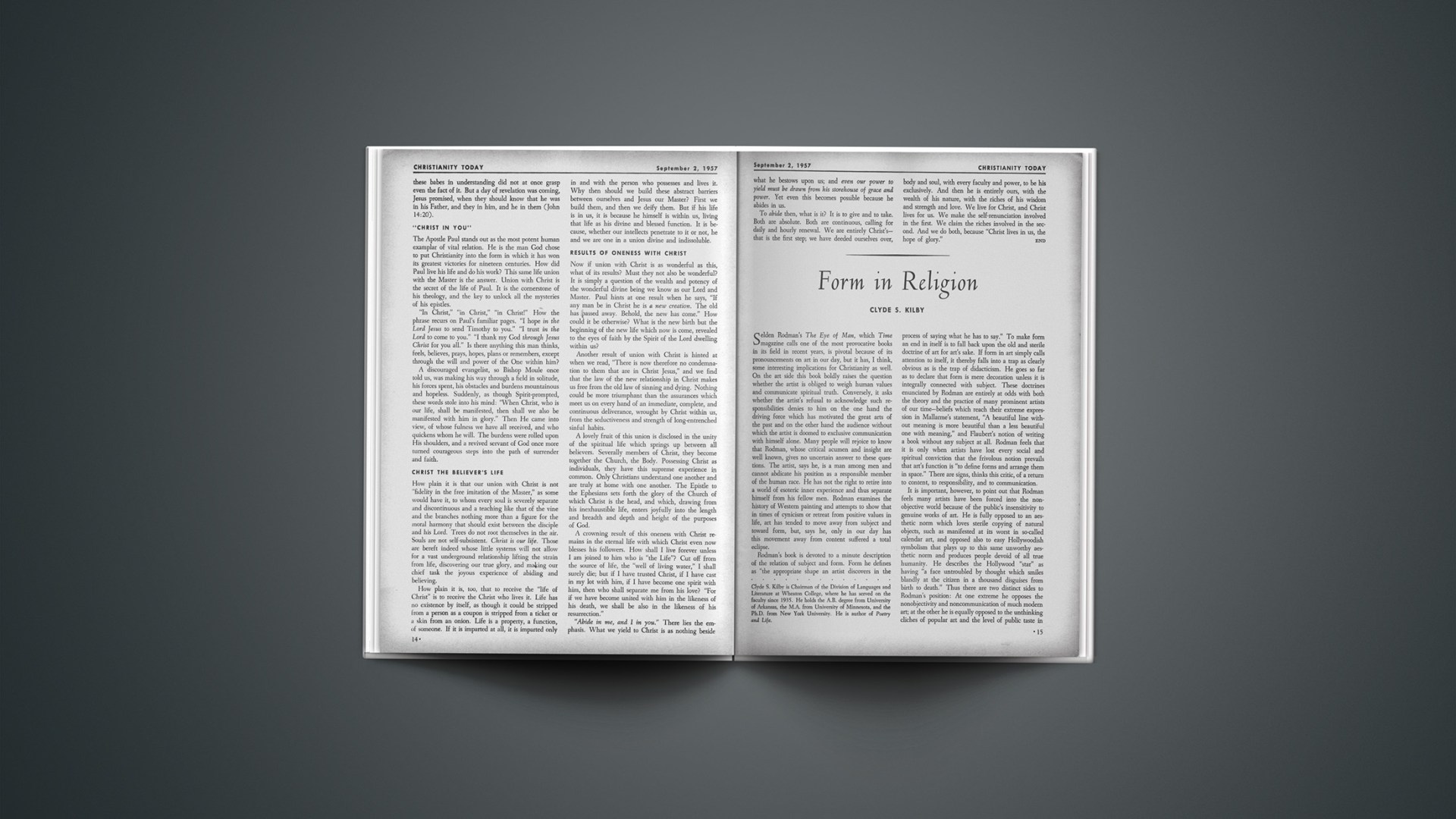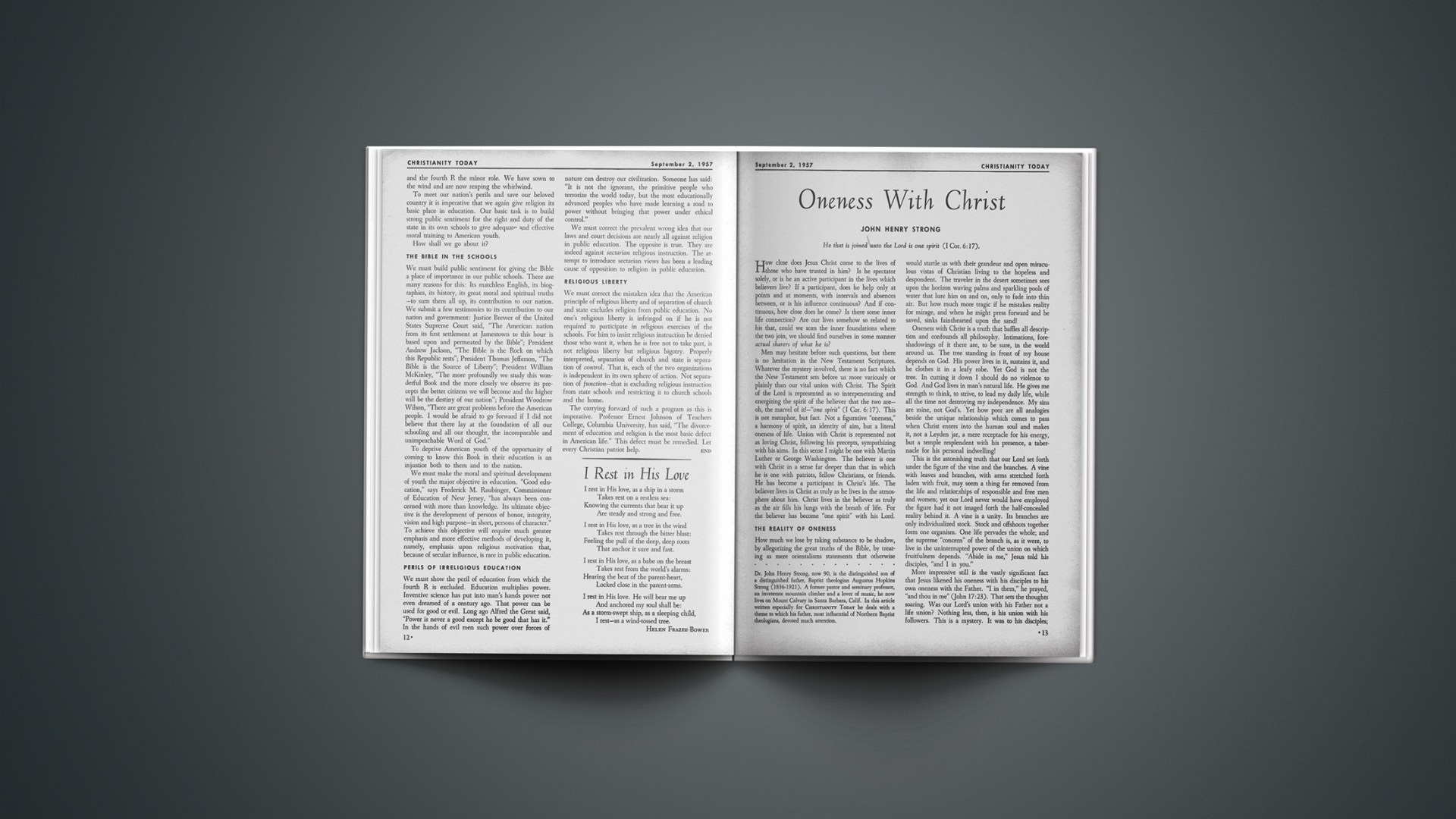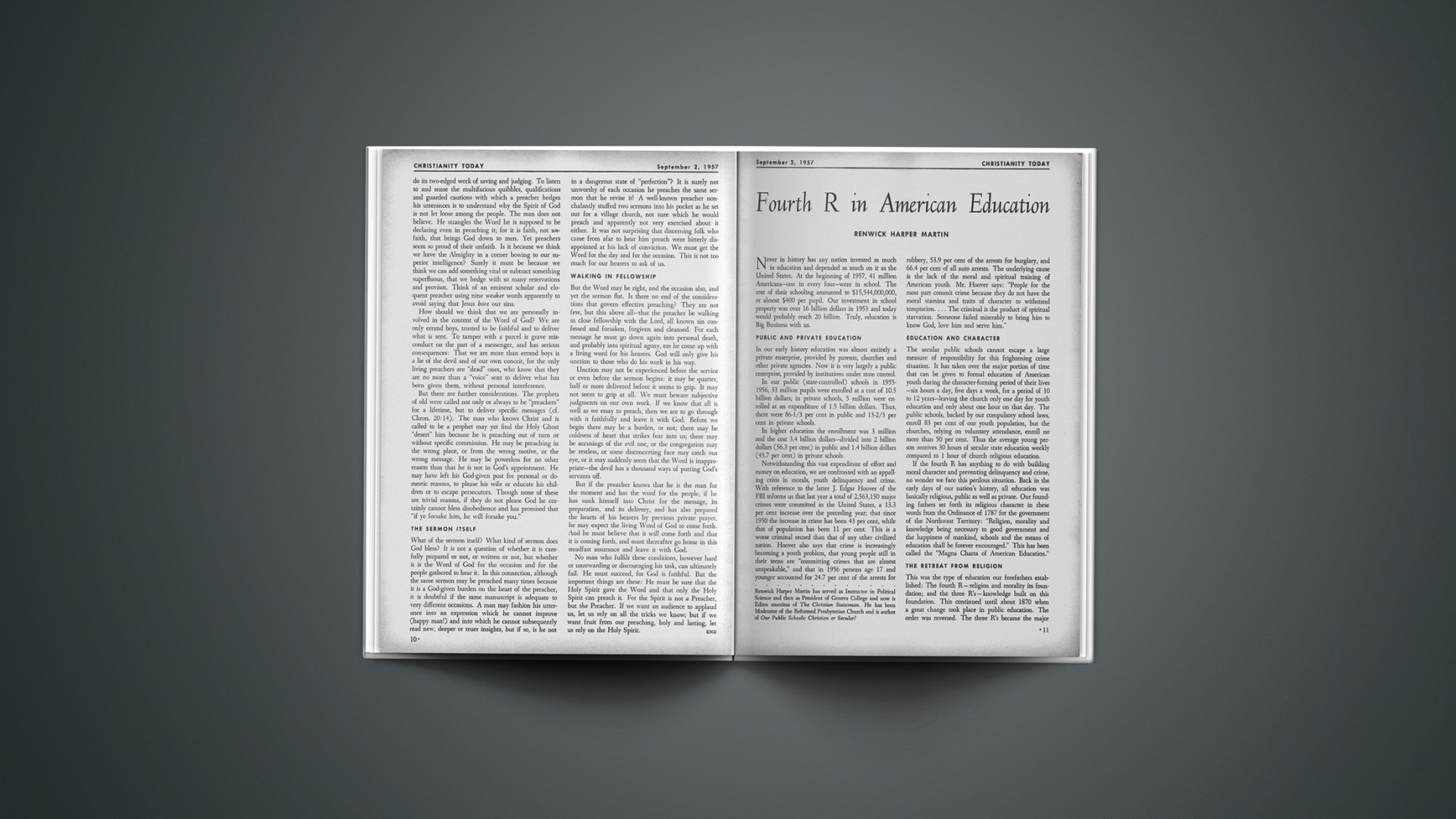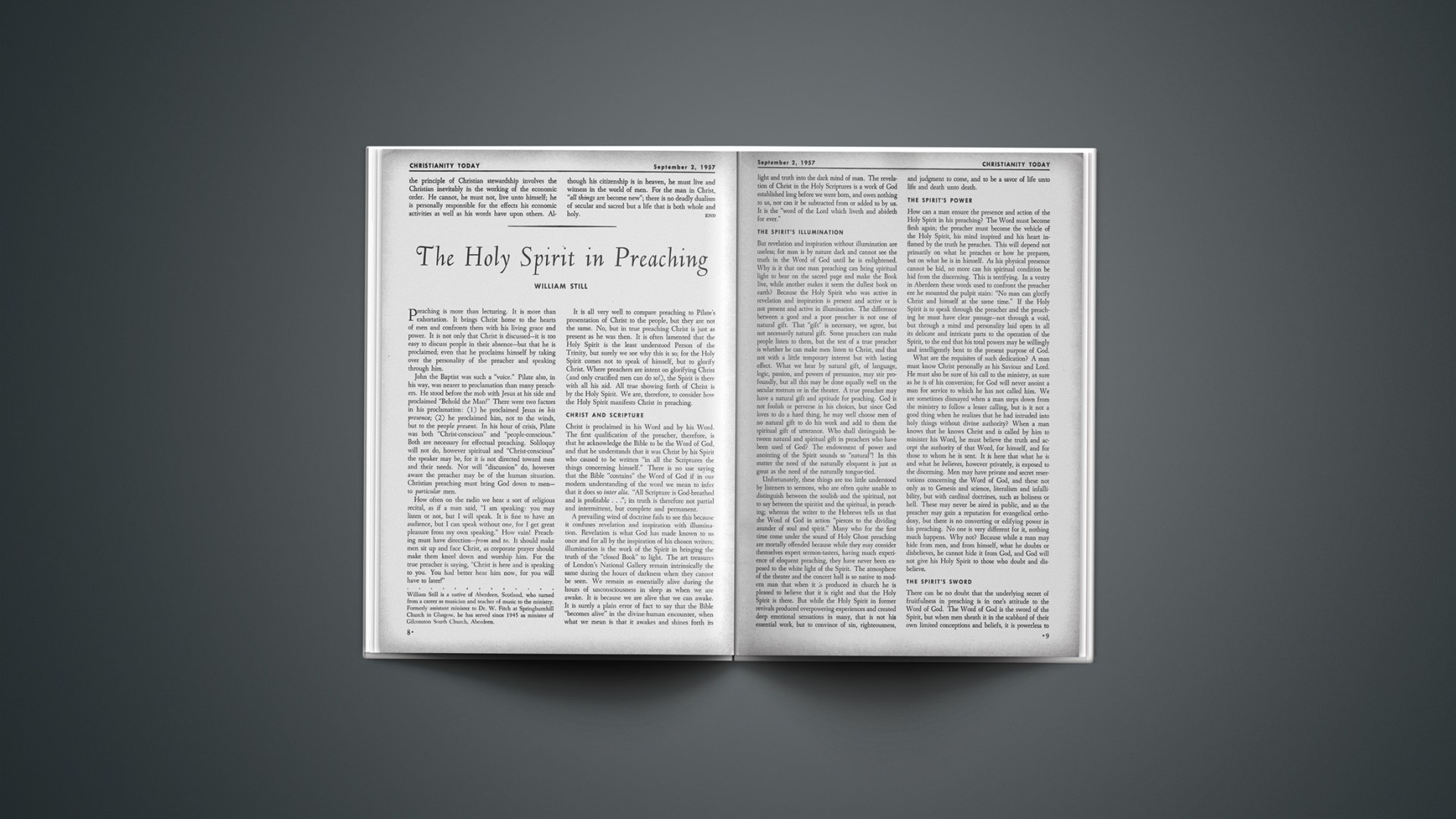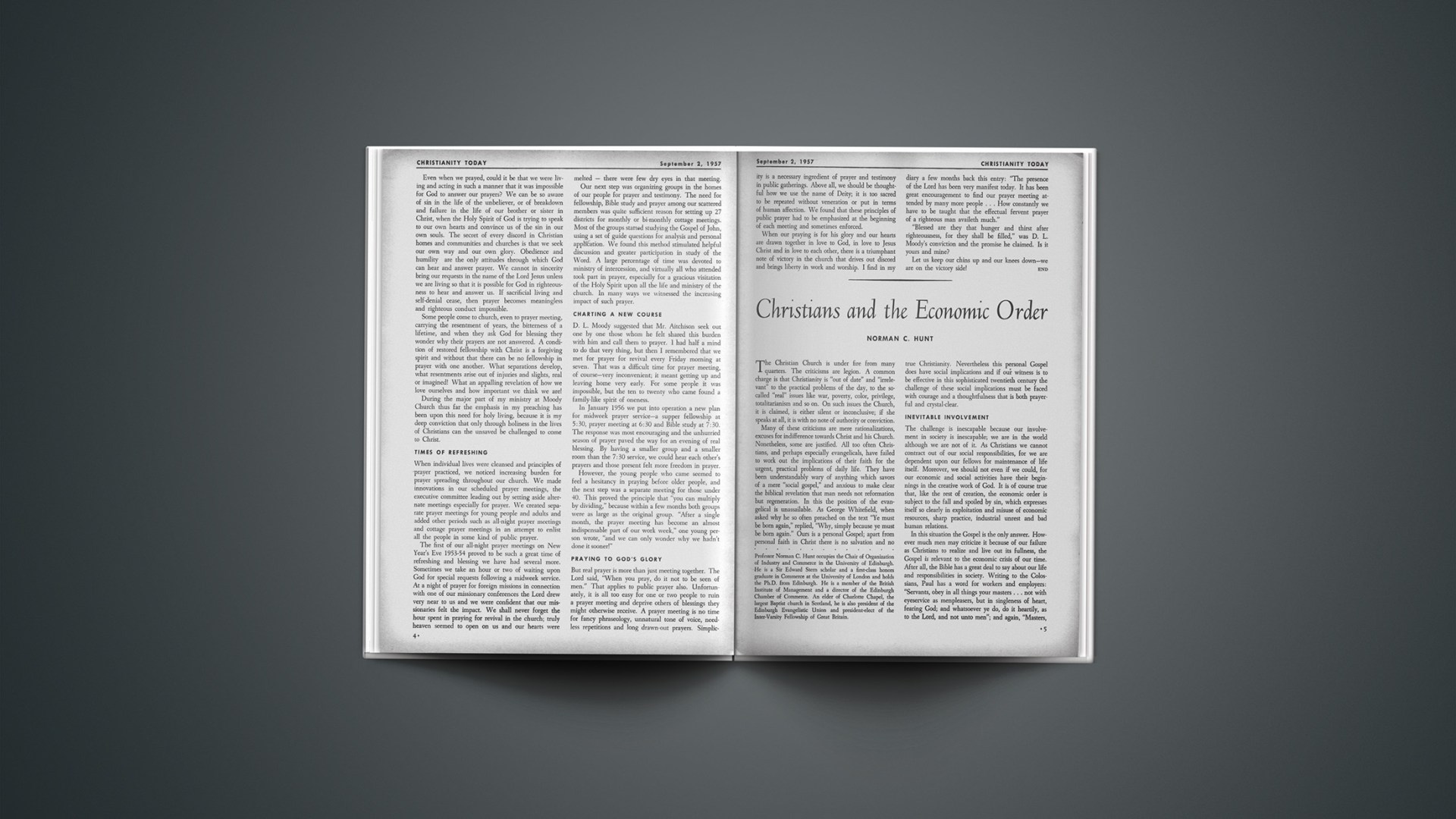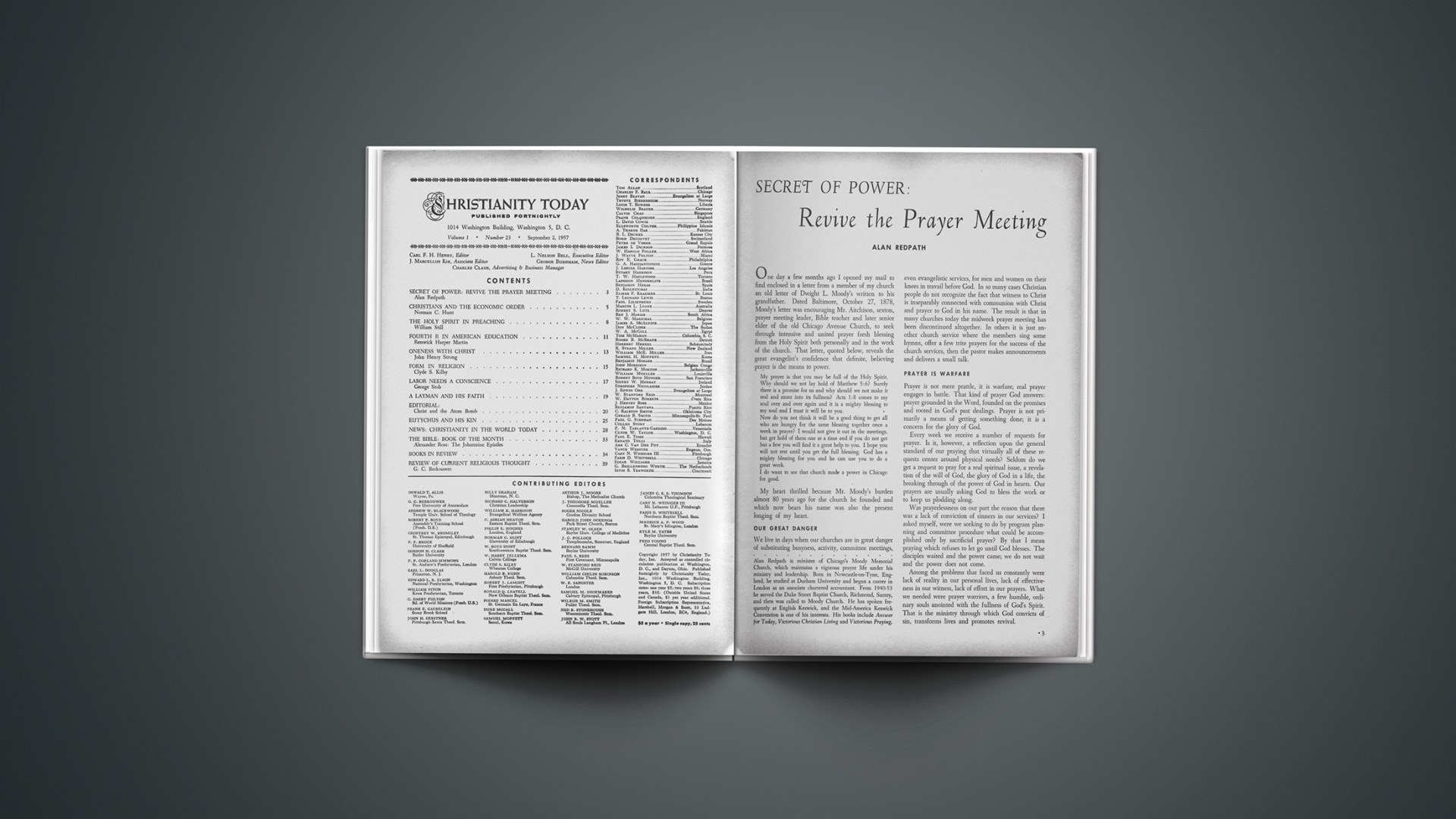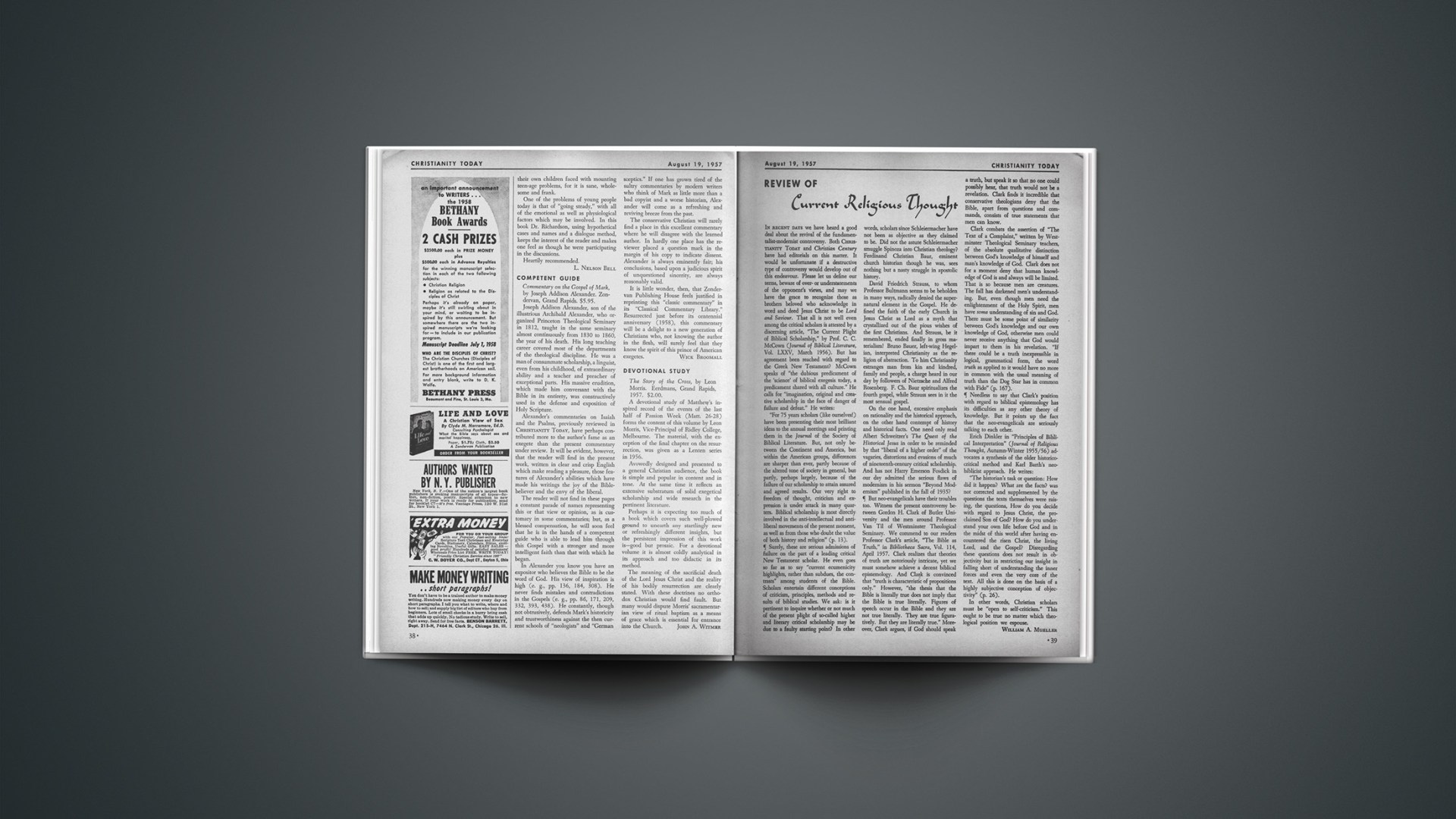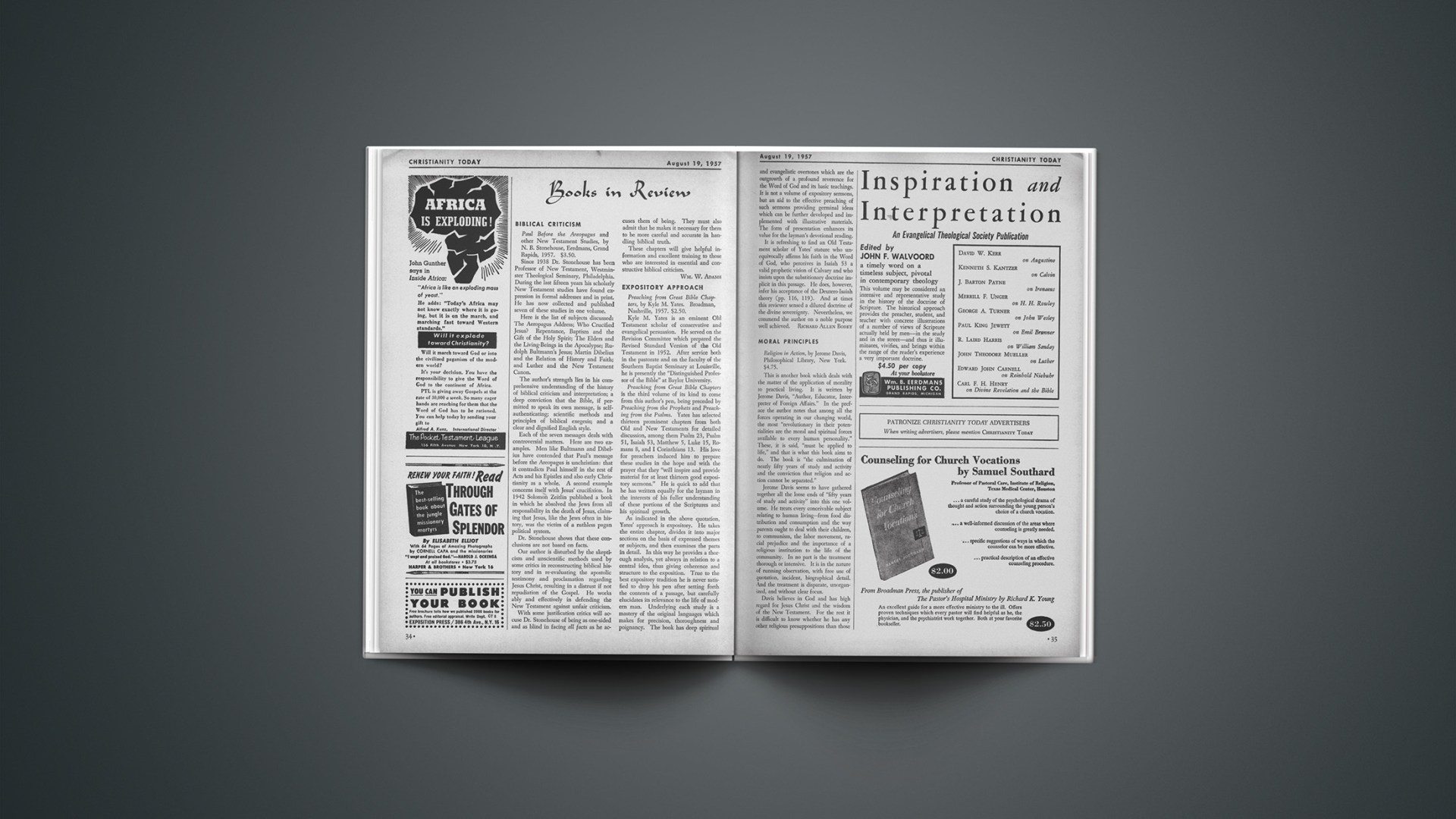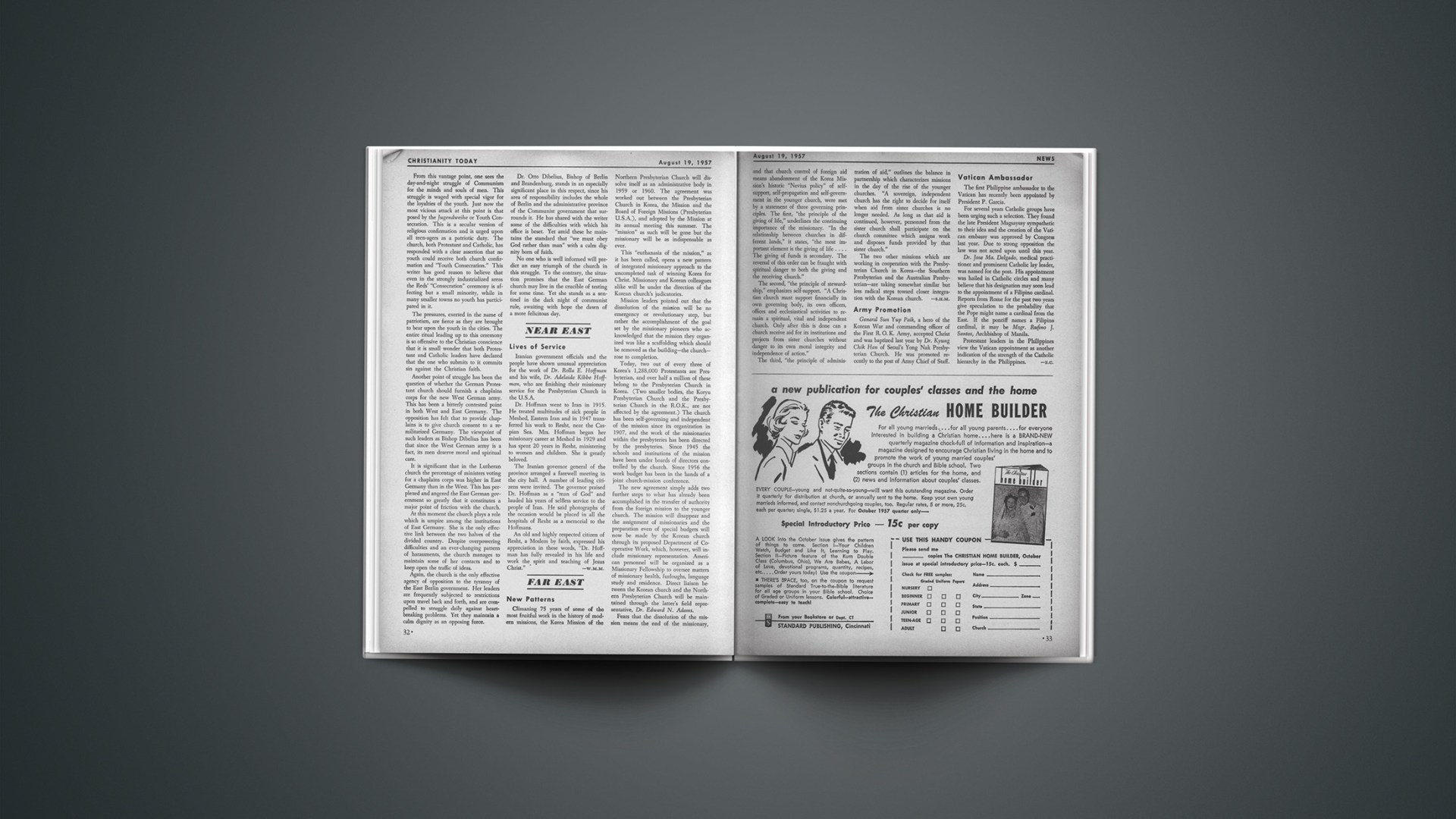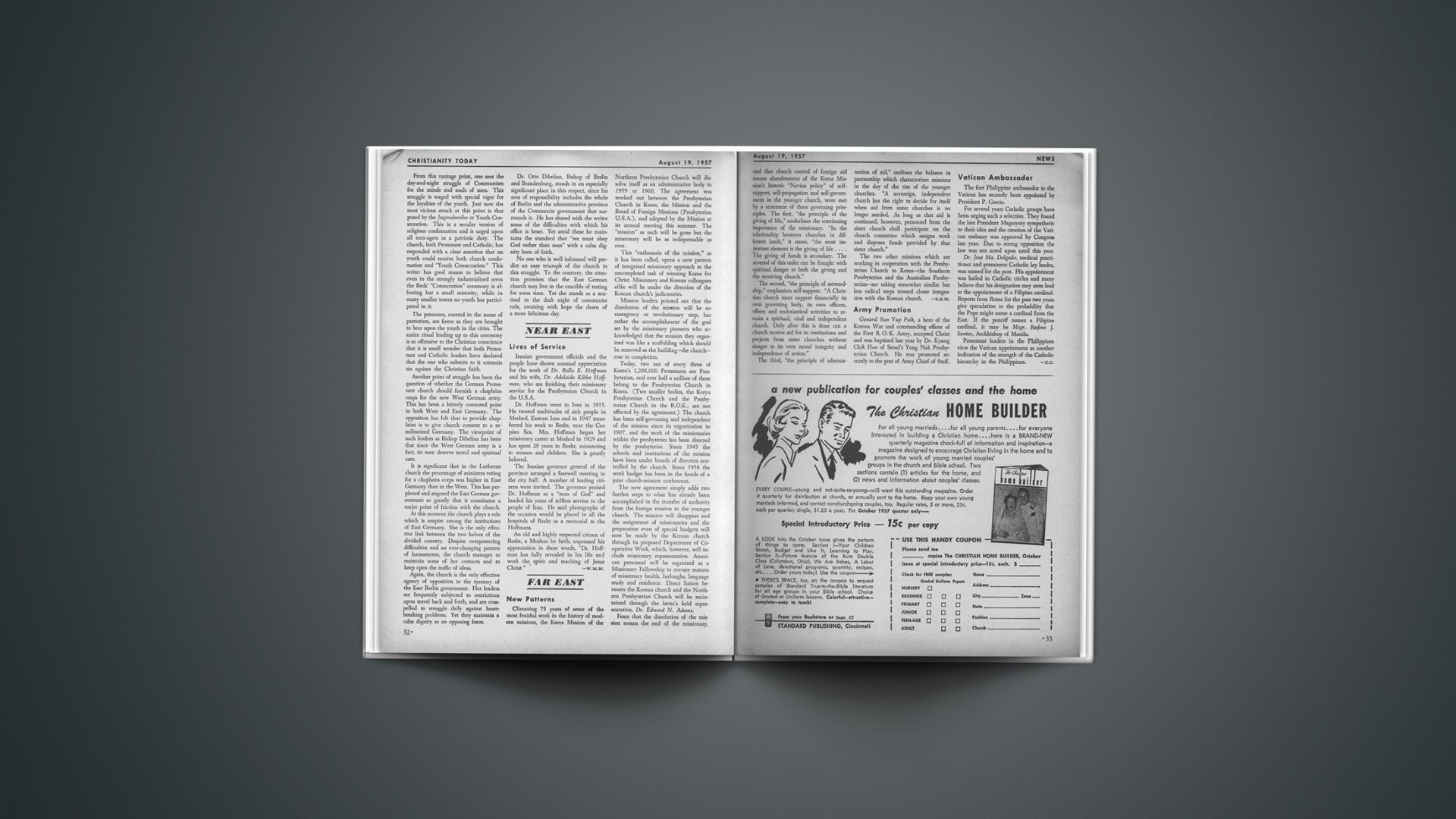Selden Rodman’s The Eye of Man, which Time magazine calls one of the most provocative books in its field in recent years, is pivotal because of its pronouncements on art in our day, but it has, I think, some interesting implications for Christianity as well. On the art side this book boldly raises the question whether the artist is obliged to weigh human values and communicate spiritual truth. Conversely, it asks whether the artist’s refusal to acknowledge such responsibilities denies to him on the one hand the driving force which has motivated the great arts of the past and on the other hand the audience without which the artist is doomed to exclusive communication with himself alone. Many people will rejoice to know that Rodman, whose critical acumen and insight are well known, gives no uncertain answer to these questions. The artist, says he, is a man among men and cannot abdicate his position as a responsible member of the human race. He has not the right to retire into a world of esoteric inner experience and thus separate himself from his fellow men. Rodman examines the history of Western painting and attempts to show that in times of cynicism or retreat from positive values in life, art has tended to move away from subject and toward form, but, says he, only in our day has this movement away from content suffered a total eclipse.
Rodman’s book is devoted to a minute description of the relation of subject and form. Form he defines as “the appropriate shape an artist discovers in the process of saying what he has to say.” To make form an end in itself is to fall back upon the old and sterile doctrine of art for art’s sake. If form in art simply calls attention to itself, it thereby falls into a trap as clearly obvious as is the trap of didacticism. He goes so far as to declare that form is mere decoration unless it is integrally connected with subject. These doctrines enunciated by Rodman are entirely at odds with both the theory and the practice of many prominent artists of our time—beliefs which reach their extreme expression in Mallarme’s statement, “A beautiful line without meaning is more beautiful than a less beautiful one with meaning,” and Flaubert’s notion of writing a book without any subject at all. Rodman feels that it is only when artists have lost every social and spiritual conviction that the frivolous notion prevails that art’s function is “to define forms and arrange them in space.” There are signs, thinks this critic, of a return to content, to responsibility, and to communication.
It is important, however, to point out that Rodman feels many artists have been forced into the nonobjective world because of the public’s insensitivity to genuine works of art. He is fully opposed to an aesthetic norm which loves sterile copying of natural objects, such as manifested at its worst in so-called calendar art, and opposed also to easy Hollywoodish symbolism that plays up to this same unworthy aesthetic norm and produces people devoid of all true humanity. He describes the Hollywood “star” as having “a face untroubled by thought which smiles blandly at the citizen in a thousand disguises from birth to death.” Thus there are two distinct sides to Rodman’s position: At one extreme he opposes the nonobjectivity and noncommunication of much modern art; at the other he is equally opposed to the unthinking cliches of popular art and the level of public taste in general. His entire book is rather well summed up in his remark that “content without supreme conviction never achieves convincing form.”
It may be profitable to discuss some ideas not explicitly put forth in Rodman’s excellent book but applicable to Christianity by implication.
The Form And The Spirit
One is that form does not mean simply the method of doing something. It is much more deep-seated than that and more nearly related to being than doing. Rodman believes that in a genuine work of art, form and content are indistinguishable from one another and that form by itself is nothing but decoration. The implication for Christianity is that form is the shape discovered and manifested in the living of a Spirit-filled life. It is not simply the outward actions of a life but the essential shape of a life at its roots whence all its motives take their beginning and their genuine nature. Form is never obvious and sterile but always dynamic and potent. Form is the eternal shape of truth making its impact upon the Christian. It is the thrusting power which molds his reborn “content” into convincing reality. Of course form will finally manifest itself in outward actions, but if it is genuine it will first of all be effectually and uniquely inner. Love, joy, peace, longsuffering, gentleness, goodness, faith. meekness, temperance—all these have infinite possibilities of manifestation in the Christian. An easy and outward definition of such Christian virtues may eventuate in a static, limited, and sometimes even unbiblical, notion of them. There are no “ten easy steps” to any of these virtues, and their manifestation in the Christian will be most telling when their “appropriate shape” has been hammered out in the unique depth of individual experience with God.
The literal translation of Ephesians 2:10 is “… we are his poems.” A poem, like any other work of art, is, above everything else, unique. There is only one of its kind in existence. God is a God of variety, whether it be in the making of snowflakes, the leaves of trees, or men. An identical twin recently said to me, “My sister and I don’t think we are alike at all.” God is a God of variety also in the re-creation of men into Christians. Phillips translated 1 Peter 4:10 as “the magnificently varied grace of God.” Form is the dynamic by which that varied grace is shaped into the unique “poem” which God wants to make out of each of his children.
Divine Poetry In Our Flesh
It is most unusual when a minister alludes to the self in us other than to denounce it. I think we might be nearer the truth if we distinguished two kinds of self. There is the self whose manifestation is selfish—the self which is everywhere condemned in the Bible. But there is also the self which God uniquely created and which he uniquely re-creates in the Christian. Nowhere in Scripture are we taught to be a zero for its own sake but only to withdraw from the selfish self so that God can mold the inner man after his own fashion; “… he that loseth his life for my sake shall find it.” George Macdonald says that God’s wrath will consume what men call themselves so that the selves God made shall appear. It seems to me that this distinction is almost totally neglected in pulpits. The implication of much preaching on the theme of denial of self is that God is seeking to produce not poems but robots. The totally yielded Christian is a man much more “himself” than is the natural man, and his new freedom is as unique and varied as heaven itself. He is genuinely God’s handiwork, God’s craftsmanship, God’s poem. D. E. Harding has well said that of necessity God’s love “individuates its objects.” Form is the eternal shape of the truth which God is manifesting in his twice-unique creatures.
Cliches Move No Mountains
Since the Reformation orthodox Christianity has very properly laid great emphasis on the fundamental doctrines of the faith. It has made the repetition of the Apostolic Creed a part of its worship and has written innumerable platforms and declarations with the intent that the faith once delivered should not be allowed to deteriorate. Orthodoxy will continue to be vitally concerned to promulgate the purity of the faith. At the same time it must avoid implying that language itself is sufficient to corral Deity. The genuine danger that men may think there are many ways to Christ must not lead to another extreme in which the recitation of a cliche becomes the only language which is thought to be good theological specie. We have concluded too often that accepting Christ and “accepting Christ” are identical, where the latter phrase means going to the front during an evangelistic campaign, getting on one’s knees, saying certain words, standing up and shaking hands, and afterward giving one’s testimony. Too often we are not willing to leave the work of the Holy Spirit to the Holy Spirit himself. God’s purpose to form the new man in Christ is fully as vital as what Rodman would call the subject matter, i.e., the doctrines of Christianity. Without denying the Bible as our rule of faith and practice and as the perspective for every part of life, we may say also that the Bible was never intended as a yardstick by which the orthodox should pharisaically measure their fellows and then attempt to whip them into line. God will not form a new man any different from the standard indicated in Scripture, but he may form that man different from our own redaction of Scripture into case-hardened language.
The calling of a Christian is to lead “naturally” a supernatural life. His conduct is expected to proceed from the deepest Spirit-stirred motives. He is expected to be, paradoxically, himself in the completest fashion and at the same time nothing at all. If the right sort of result is to prevail, God must be allowed to shape his materials after a unique pattern. The Christian will be involved in never-ending growth based on experience with the master artist. Instead of this we often place the accent on outward manifestation alone. The loudness or even jazziness of our singing is assumed to be the measure of its spiritual vitality. We listen to sermons and seldom come to any deep movement of soul. Bodily presence is substituted for communication and communion with God. In such ways superficial outward form replaces that genuine sort of form which Rodman claims for art. Every such act tends to seal over or sear the point of our spiritual sensitivity until, as C. S. Lewis has so aptly declared, “The more often [man] feels without acting, the less he will ever be able to act, and, in the long run, the less he will be able to feel”; or, as Rodman says, the religious images become “cold, intellectually self-contained, erudite and completely out of contact” with reality. The orthodox thus may be no better off in actuality than those who, again to cite Rodman, see religion so completely as history that it becomes remote and static and picturesque, “something to be endured passively Sundays as … a Tournament of Roses on New Year’s Day.” It is possible for a Christian to denounce every implication of the word form while at the same time manifesting a formalism of his own that leads to almost complete spiritual sterility. He becomes a practicing “materialist” who can never understand that God is more than the sum of his attributes.
The Gospel’s Strange Power
We must not teach the Christian, directly or indirectly, that he is to fear and denounce his own personality. Rather he is to yield it to God for the creation of a product—an artistic product if you will—after God’s own ends, in which none of the man’s God-given uniqueness is lost. Such a man is one who is at once completely himself and completely God’s, a man in whom Christian experience is daily being shaped into a product worthy of a high and holy Omnipotence. We need to feel the terrible reality of Christianity. Too often we manage to tame it. In our intensity of desire to preserve it uncontaminated, we turn it into a groove, or perhaps we should say a rut. Christianity is really a dangerous enterprise.
William Still is a native of Aberdeen, Scotland, who turned from a career as musician and teacher of music to the ministry. Formerly assistant minister to Dr. W. Fitch at Springburnhill Church in Glasgow, he has served since 1945 as minister of Gilconston South Church, Aberdeen.

